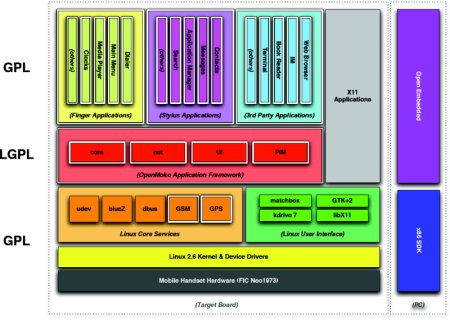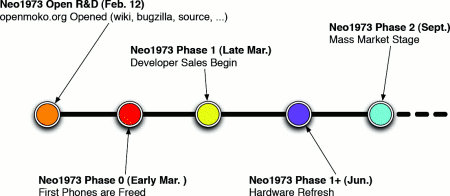OpenMoko update; Neo1973 on sale in March
Mar 2, 2007 — by LinuxDevices Staff — from the LinuxDevices Archive — 1 views Sean Moss-Pultz and Mickey Lauer revealed interesting details about their “OpenMoko” open-source phone software project, at O'Reilly's “Etel” (emerging telephony) conference this week. The pair also discussed FIC's Linux- and OpenMoko-based Neo1973, an open, hacker-friendly phone now in the first phase of production.
Sean Moss-Pultz and Mickey Lauer revealed interesting details about their “OpenMoko” open-source phone software project, at O'Reilly's “Etel” (emerging telephony) conference this week. The pair also discussed FIC's Linux- and OpenMoko-based Neo1973, an open, hacker-friendly phone now in the first phase of production.
digg this story |
Lauer and Moss-Pultz began their presentation with an academic discussion of fractals, and how complex new structures can be assembled from multiple iterations of simple, existing building blocks. The implication was that re-usable, existing open-source software components can enable OpenMoko developers to radically re-think phones, creating “new life forms,” or “neos,” because “collective experimentation leads to new life forms.” In this way, the project aims to move beyond PC-like paradigms — such as desktops, browsers, and applications — while leapfrogging current phone technology as well, Lauer and Moss-Pultz suggested.
The pair then offered some basic background and a progress report on OpenMoko, the ambitious open-source mobile phone software development effort led early on by Taiwanese computing and consumer device equipment manufacturer FIC. FIC currently funds about 30 software and 15 hardware engineers involved with the effort, which uses an open, community-based development model patterned after Nokia's Maemo project and the One Laptop Per Child Project.

“OpenMoko 2007” software stack
(Click to enlarge)
The OpenMoko 2007 stack is built using the OpenEmbedded cross-development build environment for x86 hosts. In addition to Linux, it integrates a wide range of existing open source components licensed under the GPL. It also integrates four libraries developed by the OpenMoko project, and licensed under the LGPL (Lesser General Public License), including:
- libmokocore:
- IPC (interprocess communication):
- run_contacts_application (“new_phone_number”, “555-273-172”);
- device control and application state, uses dbus(-glib), libgconf, libgconf-bridge:
- device_set_display_brightness(device, 100);
- s = device_get_signal_strength(device, MC_PERIPHERAL_GSM);
- IPC (interprocess communication):
- libmokoui — Common look & feel based on “full base GTK+ widgets,” plus additional phone widget classes on top of GTK+ (screenshot)
- libmokonet — high-level connection queries:
- peers = get_file_sinks( BT | INTERNET );
- at_home = gps_within_region( “at_home” );
- gsmconn = gsm_connection_new(“555-728-1829”);
- libmokopim — high-level PIM APIs, but will “probably never be written,” because people can “just use libebook, libecal, libcamel, and friends,” the pair say
Moss-Pultz and Lauer then walked the audience through OpenMoko's graphics libraries for stylus- and finger-driven applications, which appear to produce rather aesthetically pleasing windows, buttons, controls, menus, lists, and so on. The graphics have a glass-like translucent quality, similar to the OpenMoko logo.
Neo1973
 Lauer and Moss-Pultz concluded their presentation with an update on FIC's Neo1973 phone, expected to go on sale to developers late this month, with consumer availability this fall, following a mid-summer “hardware refresh.” It now appears that the phone will not reach market until this fall, the early developer version notwithstanding.
Lauer and Moss-Pultz concluded their presentation with an update on FIC's Neo1973 phone, expected to go on sale to developers late this month, with consumer availability this fall, following a mid-summer “hardware refresh.” It now appears that the phone will not reach market until this fall, the early developer version notwithstanding.

Neo1973 2007 timeline
Bearing the official FIC part number “FIC-GTA001,” the device's “Neo1973” marketing name was coined to evoke the idea of new life forms, and the year (1973) in which Marty Cooper invented the mobile phone, according to Moss-Pultz and Lauer. Their presentation concluded, “Welcome to the new 1973. The future is open. We're going to revolutionize it again. Only this time, you will write the rules.”
 “Hacker's Lunchbox” (Click to enlarge) |
Availability
FIC will offer the Neo1973 in two packages. A $250 “Hacker's lunchbox” comprises a development board, battery, charger, shoulder strap, USB A-B cable, and a boss-looking reinforced lunchbox container.
The “Standard Kit,” priced at $350 and likely available this fall, will include a phone, battery, headset, charger, case, stylus, lanyard, microSD card, MicroUSB cable, and manual.
 Car kit (Click to enlarge) |
Also planned is a $75 windshield mount kit with car charger and external antenna.
The complete Lauer/Moss-Pultz presentation is available for download, here.
This article was originally published on LinuxDevices.com and has been donated to the open source community by QuinStreet Inc. Please visit LinuxToday.com for up-to-date news and articles about Linux and open source.